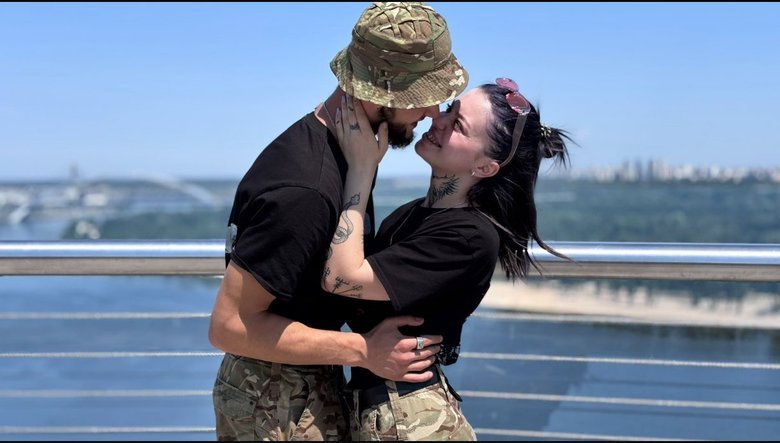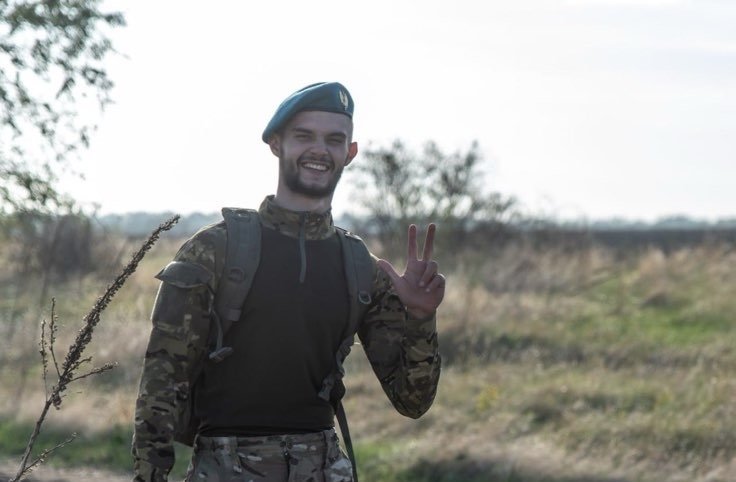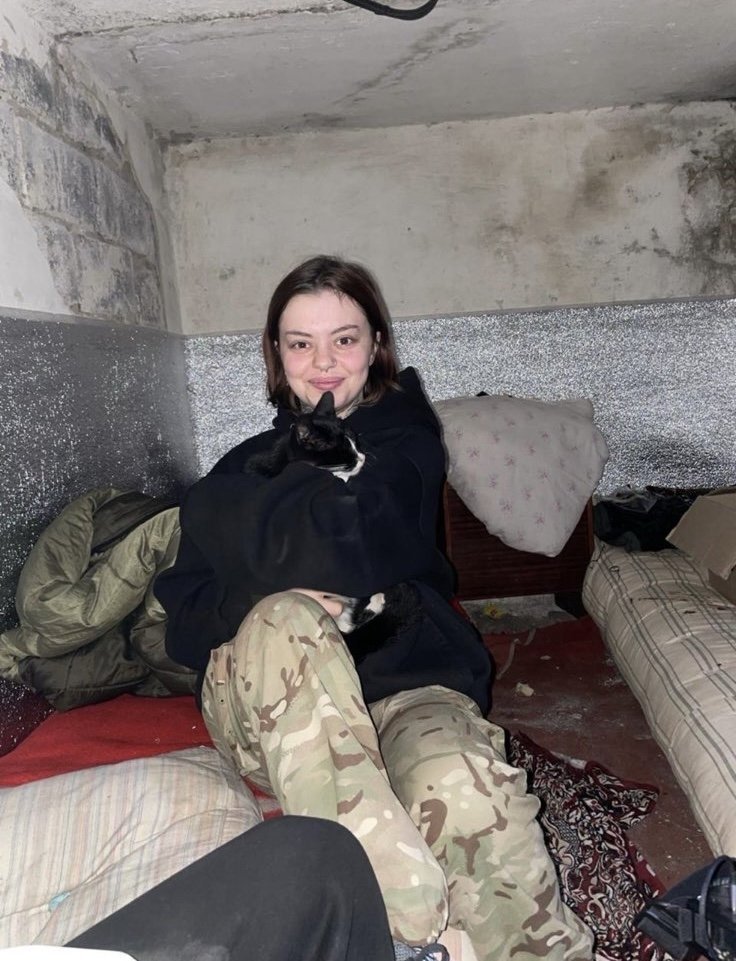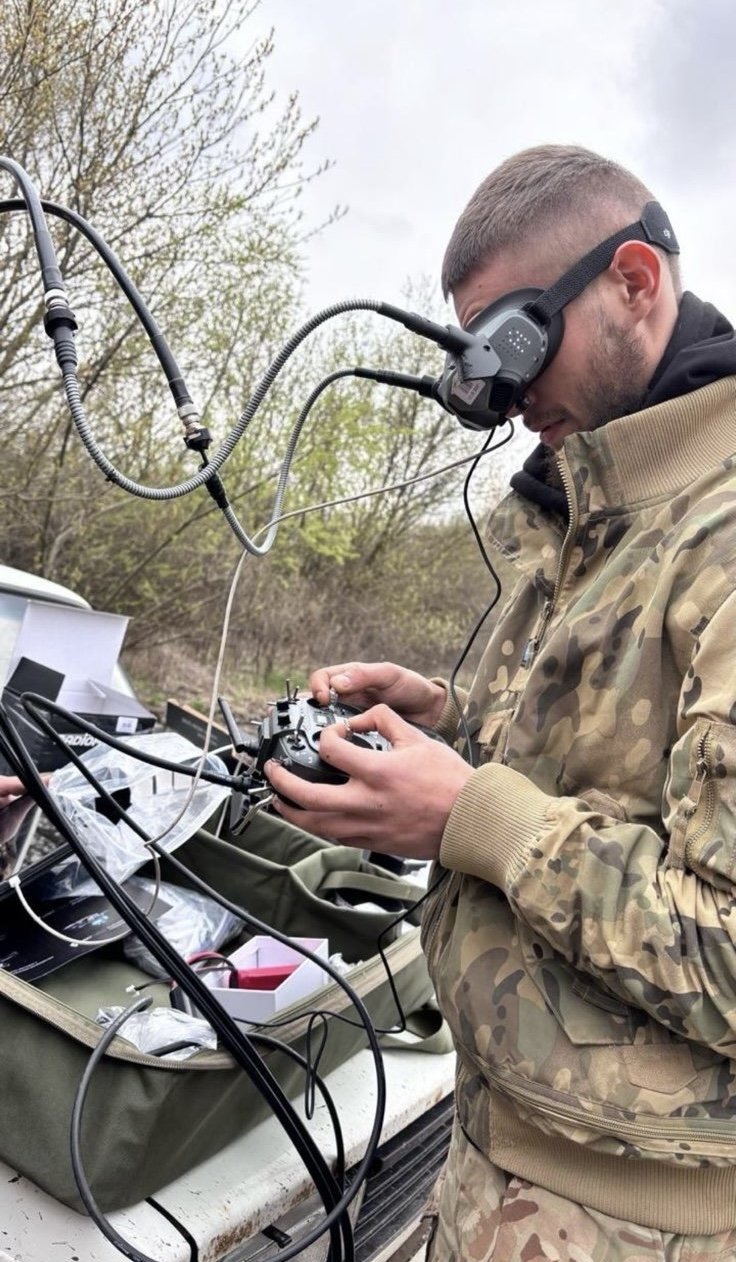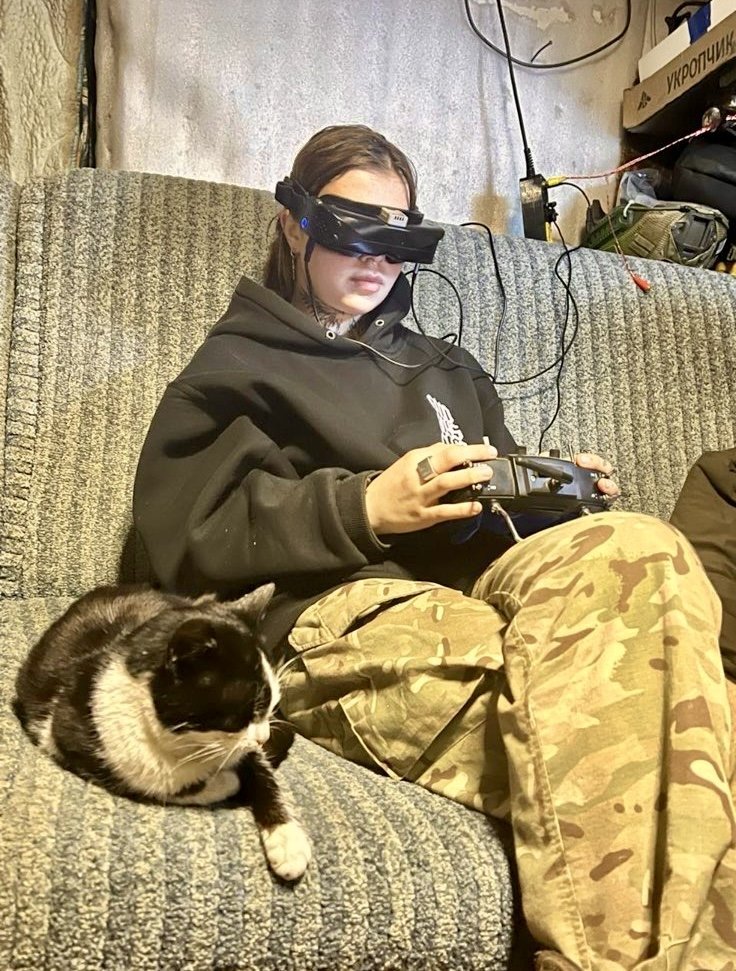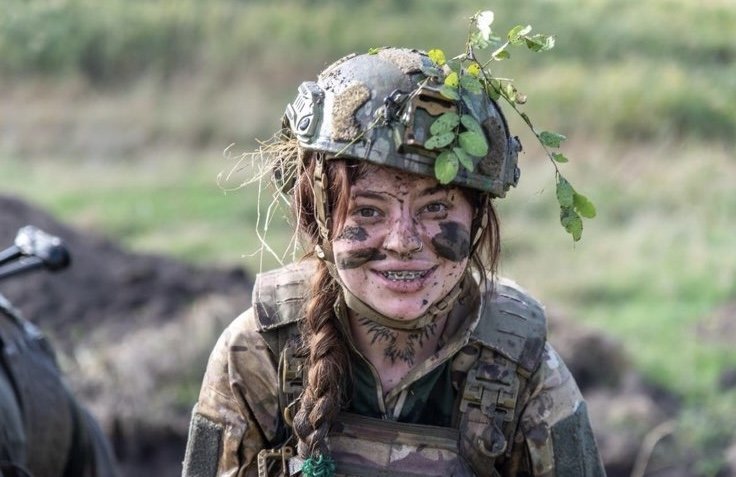Together on front line and in life: story of military couple
We met in the center of Kyiv that morning, when the right bank was still shrouded in smoke after one of the largest overnight bombardments. Fires were still being extinguished across the city, rescuers were clearing the rubble, and the air was polluted and heavy. And into this grim reality they appeared: beautiful, smiling, and calm. Yaroslav and Yuliia — a young military couple who had consciously put their normal life on hold to defend the country from the enemy.
They serve in the NOX ULTIMA unit of the MAD HAWKS battalion. He is the platoon’s senior sergeant with the callsign Hera, which comes from his surname. She is an FPV crew commander known as Enotyk (Raccoon).
"That’s what Hera and our brother-in-arms called me," Yuliia smiles. "They said I was too cunning, like a raccoon. And it stuck."
They come from different corners of Ukraine, Vinnytsia and Ternopil regions, but fight together in Donbas. They dream of a free Ukraine and are making plans for their shared future. Yaroslav has not yet proposed, but he already hinted at it by asking Yuliia to get her nails done. Next comes a small wedding.
And while the future remains uncertain, the Russians are not planning to retreat.
- Let’s start with how you joined the war.
Hera: At the very beginning of the full-scale war, I had just turned 18. For two years, I had been studying at the Sergeant Training College of the Hetman Petro Sahaidachnyi National Army Academy. On February 23, we were told that there might be some offensive in Donbas. And around 4 a.m. on the 24th, the air raid sirens went off in Lviv. My relatives were calling, telling me where missiles had hit. I opened the news, and what a shock! Russia was advancing across the whole of Ukraine.
We were quickly issued body armor, helmets, and rifles. We geared up and within a few hours, were already in vans. First, we were sent to a village in the Lviv region. That’s where the coordination began, they were turning us into a combat unit. Then we were moved to the last functioning airport in Lviv. Our platoon of 16 men took up positions in a building near the runway. We were preparing to defend it. All of us were 18. The only senior officers with us were Major Malovanyi, one of the best officers, and Sergeant Dukhnich. We were catching enemy sabotage and reconnaissance groups and similar tasks.
Gradually, the situation stabilized somewhat. Mobilized troops started arriving, and our group was tasked with training them. From scratch, we taught the very basics: cleaning weapons, technical specifications of arms, combat tactics, and so on. Essentially, everything we had been taught over two years (he smiles – O.M.). Now I recall it with a smile. Back then, it was tough. We were responsible for 30 men, grown adults who looked at us, 18-year-olds, and waited for instructions. But they listened. And we gave it our all. I used to tell them: "Guys, I’m teaching you what you will need." Sometimes I even staged ambushes. Say, they’d be heading to the dining hall at 5 in the morning, and I’d grab blanks and set up in the bushes. I could wait two hours — nothing. Then they’d finally come. I’d throw a training grenade. Ta-ta-ta! I’d shout: "Training exercise! What do we do when ambushed?" They responded. Once, they even managed to pin me down (he smiles – O.M.). Good lads! It was great.
When I graduated from the academy, I immediately went into sniper training. I ranked third in my group in terms of performance. Each of the top graduates could choose their unit. I chose the sniper company of one of the Marine brigades. Our area of responsibility was the village of Bahatyr (Donetsk region – O.M.). That’s where we engaged in battles and held the defense. And although it was frightening, I now realize that back then it was still relatively calm compared to what is happening today.
Later, we were transferred to the Kherson direction. Operation "Krynky" was the hardest thing I have ever endured. Imagine this: you land on the shore, head to a designated rally point, and the forest is full of dugouts where the "orcs" are hiding. Seizing even a patch of land there, is almost impossible. It was hell! Logistics were weak. Supplies were minimal. Every shell was worth its weight in gold. Life — even more so.
I was wounded there. I was leading the group out for evacuation. I said, "Guys, if you hear a ‘Mavic’ overhead, scatter in a checkerboard pattern and zigzag." "Roger that. Roger that"
I’d gotten used to all of it. Let my guard down a bit. And the drone, apparently, locked onto me. It went off right at my feet — bang! Four fragments into my leg. I went down. I yelled, "WIA!" My guys ran over (smiles – O.M.). Vitia, a fellow from Vinnytsia, comes up to me: "Hera, get up, get up!" I had already put a tourniquet on myself. I understood I couldn’t walk on my own. Vitya got me under the arms, we made it to a tree. The drone comes back — we dive into a hole. It made a drop, but luckily it didn’t hit anyone. We moved to another spot. We sat under the riverbank all night. Frostbite, pain, cold. But alive. All good.
Then there was another episode: four of our guys, Saper, Maniak, Batia, and Sania, moved out to a position. Within a day, a 120 mm mortar round landed right on it. All of them were serious "WIA." We were the evacuation team. We ran to pull them out. We carried one, then the second, and that’s when a b#stard machine-gunner opened up on us. One of ours, Chip, took a round in the arm. He passed out. Another one, Engineer, got hit on the helmet and was knocked down. We hit the dirt. Maniak, the one we were evacuating, was lying there, not understanding anything, and he was wounded all over — arms, legs, torso. He begged, "Get me out of here, boys!" I dashed to another shell hole. Chip came to, ran over to me. I cinched a tourniquet on him hard, right over the jacket. We had to pull back. I led Chip to the basement. Took another guy in his place. He and I went back for Maniak. It was getting dark. We reached the spot where we’d left him and he was gone. Then I see an antenna just barely sticking out of the ground. We got him out. We grabbed him. We carried him fast because the shelling was on. He was screaming. It was his birthday that day, by the way. Turns out he’s got a second one now. We brought him to a safe place too, stopped the bleeding, rewrapped him. At night, we carried him to the evac point. They took them out. And I stayed with five guys. Getting out of there then was almost impossible. Every boat that came up to us could have been the last because of drones, mines, and those b#stards machine-gunners. The Konka River is a terrifying place.
Enotyk: I joined the war almost two years ago, when I turned 18. In 2014, when the war in Donbas began, many of my relatives went to fight. I was nine then, but I understood that as soon as I came of age, I would go into the military because I needed to. When I finally was old enough, I went to the recruitment center. They, of course, didn’t want to take me. They said I was too young. And I was wearing a skirt and a top, with makeup and lipstick (she smiles – O.M.). They were like, "Child, where are you going? What are you thinking?" And I said, "Give me the contract. I’ll sign right here." At first, I got a letter of request to the sniper company as a sniper, where Hera was. There they told me to sort papers and cook. Only later did he bring me into UAVs.
Hera: I had just transferred to the reconnaissance company, which had a separate UAV platoon. That was in February 2024.
- And how did you meet? Do you remember the first time you saw each other?
Enotyk: I do. I had been in service for a week when he got back from Krynyky. I was called in to meet the platoon commander. I went. I introduce myself, and he goes, "Girls just get in the way of real men doing their job in the army!" Well, fine then (she smiles – O.M.). After that, he kept picking on me: "Kid, kid, kid, kid" (she laughs – O.M.). But he also protected me.
-So you liked her!
Hera: I liked her right away! So when I transferred to UAVs, I decided to bring her in too. Our platoon commander, Bingo, picked me up in an armored vehicle. I was flying a Mavic, doing reconnaissance with a buddy. We were doing great. Then we talked to Bingo about Yulia. He asked if she was solid (Enotyk laughs – O.M.). I said, "Yes, all good. She’ll follow orders, she’ll fly. We should take her." About three days later, she was already with us in reconnaissance. At first, she was afraid to fly. I took her to the range and trained her. I didn’t yell, and she liked that, I see it. Then a task came down in our platoon that we needed to spin up some FPV work. Flying was cool, but we wanted to engage targets. I was appointed FPV section leader. There were three of us at first. We started testing things. Over time, it all grew into a full platoon. Yulia was flying by then too. Later, I asked her out…
Enotyk interrupts: When?
Hera: The 24th of (he stumbles – O.M.) May.
Enotyk: Well, we’ll talk later! Not June, huh? (she laughs – O.M.).
Hera: June 24 last year. Exactly! (both smile – O.M.).
- Yuliia, how did you respond to his proposal?
Enotyk: When he asked, at first I kept quiet. Then I said, "Well, probably yes." And I’m sitting there thinking: Finally! (she laughs – O.M.). After that we pretended for about half a year that we weren’t dating. Bingo teased us: "How are you two, best friends?!" But everyone understood everything.
Hera: Everyone knew! We just didn’t talk about it.
- Is it harder when your loved one is next to you at the front, or the opposite?
Enotyk: While we were in the same crew, I was much calmer — for myself and for him.
Hera: I already had extensive combat experience. And if something happened, I knew what to do. Now that she’s in a different crew, it’s harder for me. I worry. We have comms, so I have a sense of how things are. But if something happened, I’d go to them on foot by myself if I had to!
- Is it scary?
Enotyk: It’s scary…
Hera: Even more so for me! Not for myself. I’m scared for her.
Enotyk: The scariest are the rotations. When the vehicle pulls up and in five minutes (which is actually a lot) you have to manage everything — load, unload, get people aboard, climb in yourself. Before the vehicle arrives, we always agree among ourselves to do everything very quietly so we can listen, and if anything, either scatter or whatever’s needed. But usually it turns into: "Go, move, f***ing move! A-a-a-a!" So, yeah, keeping it quiet doesn’t really work (smiles – O.M.).
- What was your first combat sortie like?
Enotyk: My squad section leader, Klim, was sitting next to me. I told him, "Please, you take it!" I was scared to take off. I’m holding the controller and my hands are shaking. I’m thinking: what if I crash right over our own position? That’s happened since then. It still can, if a drone has some fault. It checks out fine back at base, and then it doesn’t. Maybe it’s the transport.
Hera: A contact can come loose and on takeoff the drone can, for example, flip over. Then you either have to disarm it or neutralize it.
Enotyk: If we can do it quickly, the guys go out and disarm it. Then either they remove the warhead, or I launch it again.
Hera: It all depends on which board is installed…
Enotyk: If it’s configured for impact detonation, no one approaches, we wait. We blow it remotely and that’s it. If it’s set up for command detonation from the controller, we disarm it.
Hera: It’s better not to take risks and just yank it in the yard. We had a similar situation in the Kherson region. We were told to move into a spot where an elderly civilian woman lived. Everything was fine for her there, the house intact, new plastic windows. And our launch site was right next to it. It was camouflaged so we wouldn’t get "burned." At first, the granny was like, "Oh no, you can’t! That thing flies. Ay-ay-ay!" We explained that we were working there, that’s what we’d been ordered to do.
- Did you offer to evacuate her?
Hera: Of course. She said both her children and grandchildren had abandoned her.
Enotyk: She just kept living there as she was. Later, she was calm about us sitting there.
Hera: She got used to it. She would constantly come over and call out: "Yaro-o-o-sla-a-a-v!"
Enotyk: He was her favorite (she smiles – O.M.).
Hera: So about that incident. I took off, but the drone dropped under the fence and flipped over, no way to disarm it. Yulia and I had Vovchyk in our crew then. He says, "Let me go and disarm it." I’m like, "Stay put! Let’s think this through." We put on helmets and body armor and ran over. Took a look - no, impossible. We pulled some ropes from the bag, made improvised grappling hooks out of nails, hooked the drone, ran over into the second yard, and when Vovchyk gave it a yank - boom! It had a one-kilogram high-explosive charge. The granny’s entire flowerbed was shredded, the windows blew out. We dashed into the cellar. Half an hour later, the granny shows up: "Boys, something landed right in my yard!" I say, "The Russians are six kilometers out. They’re firing." She brings this huge roll of tarpaulin and says to me, "Yaroslav, help me!" Toward evening, Vovchyk and I went to board up the windows in the summer kitchen…
Enotyk: Wait, not quite. We still had a task to do then. And she kept coming every ten minutes: "Yaro-o-o-sla-a-a-v, fix it! I’ll lie down here in your cellar and stay put until you do!"
Hera: She sat there under that cellar and just waited. For an hour. I said, "Vovchyk, let’s go." We boarded up the windows, cut the tarpaulin, all good. But it’s the frontline zone, who’s boarding up windows there anyway? (he smiles – O.M.).
Then another drone took off, something shorted, and it blew itself up. The same windows were blown out again, the tarpaulin burned. And the granny comes back: "Do it again!"
- Were there many civilians left there at all?
Hera: Yes. There was even a store still open. The selection was small, but you could buy something.
Enotyk: Mostly, it was grannies and grandpas who stayed. The young people had left.
- Siri from your unit told me that, for example, in Donbas young people didn’t always want to leave. Even during evacuations, they hid their children in basements so they wouldn’t be taken out.
Enotyk: In Donbas, that’s very common.
Hera: In other regions, people help and want us to come and liberate those lands. In Donbas it’s not like that. About a week ago I was walking back from Yulia’s position, and in a village on the line of contact, a grandpa called out to me: "Hey, why are you carrying that rifle? Take a hoe instead and come dig my garden!" Then he comes closer, wants to snatch the rifle. I told him, "Don’t, grandpa, don’t." I had the commander of an adjacent platoon with me. He immediately said, "Hera, Hera, don’t touch him." And I’m the kind who won’t just put up with that. But I listened. We went to the pickup point where a vehicle was supposed to collect us.
- And do the "awaiters" show themselves openly there? Do people tell you they didn’t ask you to come, like at the start of the war?
Enotyk: I haven’t had that happen. But, actually, in Donbas for the first time in almost two years of service a granny brought me flowers from her garden and thanked me for my work. I cried so hard! When I went there, I’d decided I wouldn’t talk to anyone because I thought they were all "awaiters" (the ones waiting for Russia - ed.note)
Hera: That really was the first thought. But in reality there are plenty of normal people there who support us. Some are waiting for liberation. There are also neutral ones who say, "We don’t want to be with either side. We just live here." They just keep digging their gardens…
Enotyk: In one village you had the b#stards assaulting from one side while a family on the other side was planting potatoes. I think they believe the enemy doesn’t touch civilians. But that’s not true.
- I asked you about your very first combat sortie. Now, recall the toughest one.
Hera: For me it was when two of our guys were holding a position in a single dugout. Yulia was in my crew then. Dale as well. We were working in the Donetsk sector. Our two were holding off an assault. Against them were four vehicles almost at point-blank range. We hit them. They were burning. The b#stards jumped out, climbed into a trench, and we picked them off. You take off and think: just let the drone not lose lift or fail midair. You understand: you have to save them. In the end, we beat back that assault. The guys withdrew. All good.
Enotyk: The first time I was already at a position with my own crew, no commanders and no "top" cover, there was an assault. And I knew our drones weren’t of the best quality. It was tough. But we managed. We took out a motorbike-riding b#stard.
Hera: I saw it, by the way. It was perfect! He flipped right over. Epic.
Enotyk: I was proud of us then (she smiles – O.M.). But on that sortie, it was our only proper hit. The drones were letting us down a bit. Supply was really tough at that time, because the f***ers had struck our depot. So for our position they picked the best of the worst. But we couldn’t complain, because it was hard for everyone then.
There was another moment. I was flying on tasking, I don’t remember exactly what the target was, probably personnel. Suddenly, an enemy drone jammed my video feed, I started receiving not my own picture but his. I saw how he was moving in to strike our vehicle in a tree line, where two of our guys were. He hit it. My feed came back. And I thought: what happened to our guys? We launched the Matrice to check. We saw another FPV had arrived and finished off the same vehicle. It burned.
- Did the guys survive or die?
Enotyk: I don’t know… I hope they managed to get out.
- Apart from Mavic and FPV, what else did you fly?
Enotyk: I tried the Matrice at the range, but it didn’t click with me. Don’t know why. Just not my thing.
Hera: I also flew mainly on Mavics and FPVs.
- Have you tried flying larger drones, like the Vampire?
Hera: No. Honestly, there wasn’t time. I was working nonstop. You get back from a position, take a short rest. Then straight to the workshop with the guys, helping out there. Back then I was still a section commander, and later a senior sergeant. So it turned out I’d return from a position and immediately get to my own line of work: sergeant duties, organizational stuff. Then I back to the position, where I’d be hitting the b#stards again. On and on. So I didn’t even have the chance to try something new. Though I’d really like to fly a Vampire.
Enotyk: I’ve been thinking about that recently, too. But in any case it’s not easy.
Hera: Once I had to load a Hummer with Vampire ammo. Those reels are huge. About a ton and a half altogether. The driver, callsign Bumik, offered to help. We said, "No, no, better you sit and have a smoke. We’ll handle it." We did. He drove off. When he came back, I felt such relief seeing he was intact. He goes, "Damn, you screwed me over! I opened the container and saw that!" (he laughs – O.M.). But we managed.
Actually, we did test an FPV "shotgun", a modified drone. We were flying and hunting for an enemy Mavic. It was fun and exciting, but extremely hard to find, even with a digital camera. I was one of the first in our brigade to try it. The battalion commander sent me. He said: "Go, shoot it down!" But I didn’t. There were issues: if the drone lost control, the safety system triggered and the shells fired off. Then you had to return. I made about 50 sorties in a single day: back and forth, back and forth!
- And what’s the most sorties you’ve done in a day?
Hera: That same day with the shotgun drone — 50.
Enotyk: For me, around 20. Thankfully, not with the shotgun drone (she smiles – O.M.). Just on strike missions.
- What do you target most often now?
Enotyk: We fire on everything enemy we can spot. Personally, I like firing on infantry…
- By the way, a servicewoman with the callsign Zmiia said in an interview that, in her observation, women feel less pity for the enemy. Is that true?
Enotyk: I think so. I want them all to die. Preferably all at once. I want to kill them!
Hera: And we want them punished for what they’re doing. You saw the news about how they tied our guy to a quad bike… And how many POWs they kill and torture. Not to mention, they even summarily execute their own right there in formation if someone refuses to go on a task.
- And yet they still go!
Hera: Because in the tree line you have a better chance of surviving than if you refuse in formation.
- The problem isn’t just manpower but also weapons, especially UAVs. A soldier nicknamed Khmuryi recently told me in an interview: "You fly early in the morning, when the sun is low, and you see how many drones are on fiber, everything around looks like a spider web"…
Enotyk: That’s exactly how it was at our previous position. That village is occupied now. It’s truly terrifying there.
- Are they using fiber more now?
Enotyk: Depends. Against our vehicles — fiber-optics.
Hera: And against launch points and infantry positions they operate over radio link.
- I know they also have plenty of reconnaissance UAVs.
Hera: Yes. We were, by the way, among the first units to do air defense. We tried, but our drones weren’t fully tuned yet. When we flew up to a fixed-wing, it wouldn’t detonate. Still, we found a lot of them, even though it’s extremely difficult.
- Have you seen any new enemy tech? I read they already have fiber-optics drones with spools good for 50 kilometers. Do you have those in your sector?
Hera: We do. They can go very far. I was the senior in charge of loading a Kirpi in a village where you wouldn’t even think anything could be flying (50–60 km from the line of contact). We were loading up and I heard an FPV inbound. Definitely not ours! It hovered right over us. I ordered the guys, "Spread out, keep your distance! Don’t bunch up!" The drone went for the vehicle. Then it came back to us again. We scattered once more. It crashed about ten meters from our truck.
- Do you keep statistics on your hits?
Hera: The statistics are kept by higher command, not by us.
Enotyk: I used to count my hits…
Hera: And then she lost track (Enotyk smiles – O.M.). But we can have 15–20 sorties a day.
Enotyk: On the last run I had two "KIA" and just as many "WIA" among the bastards. That one’s precise!
- Do they evacuate their wounded?
Hera: I’ve seen it only once. They grabbed a handcart and went across a field to pick someone up. Usually they leave them there. They move in twos or threes. And if one of them is a "WIA," that’s it.
- Lately they’ve been using this tactic of moving in small groups, right?
Hera: The last mechanized assault was about three months ago. Drones take out vehicles very quickly. They figured that out. Now they ride up on motorcycles, dismount, and then advance on foot toward the positions.
- Has their manpower changed? More or fewer of them?
Enotyk: There have always been a lot of them.
- I ask because the negotiation process isn’t over. Internationally there’s talk of a ceasefire and a possible truce…
Hera: That has no effect at the front. Their army corps here are loosely divided and do as they please. I think even if there were some kind of truce, one of those corps would keep pushing forward.
Enotyk: I don’t believe in a truce or negotiations at all. It’s box-ticking. I don’t mean our side, I mean the U.S., for example. They just have to say something. File the report and that’s it. If they genuinely wanted peace and simple quiet, we wouldn’t be losing as much territory as we are now.
- Lastly, let me ask you something personal. Do you plan to get married?
Hera: Of course we will!
Enotyk: In all my service I had never once done a manicure (Yuliia’s nails are neat, painted a soft blue – O.M.). When we went on leave, he told me: "Yulia, go get your nails done." We came back, and Bingo, as always: "So, when’s the wedding? When are the kids?" Yaroslav just sat there smiling: "Boys and girls, soon I’ll be making a proposal." It was the first time I went to a position with a manicure. It got a bit chipped. And my nails had grown out. So Yaroslav said: "Redo it!" I answered: "Fine! I’ll keep redoing it until you propose" (she smiles – O.M.). But let it be a surprise.
- Do you want a wedding?
Hera: A small one.
Enotyk: Yes, small. But I want to be in a beautiful white dress with a veil.
Hera: And I’ll be in some kind of British-style uniform (he smiles – O.M.).
- Do you think about your future in general?
Hera: We do think about our future, but mostly about how to end the war as soon as possible.
- And what do you dream about?
Enotyk: To live in a free Ukraine. With Donbas. With Crimea. With all the liberated territories that are now under occupation. That’s a great dream. And without the "waiters." That’s even better!
P.S.: Friends! The NOX ULTIMA strike UAV company carries out combat missions every day on the hottest frontlines. Each sortie is an opportunity to destroy the enemy, save the lives of our soldiers, and bring Victory closer. But for the crew to operate effectively, additional equipment is needed. The total cost is UAH 60,000. We appeal to everyone who cares to help!
Link to the fundraising account: https://send.monobank.ua/jar/M4FX6cEDw
 Card number: 4874 1000 2804 0932
Card number: 4874 1000 2804 0932
Olha Moskaliuk, Censor.NET
Photos provided by the interviewees

